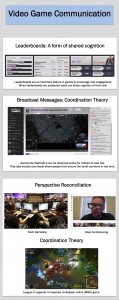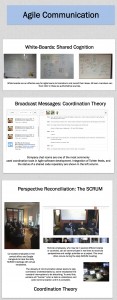MBA Thesis by Clarke Foley Read Here
University at Albany School of Business 2013
Clarke_Foley_MBA_Research_Poster
Executive Summary
As a project manager on Agile software development teams for the last three years, it has been my job to facilitate and improve communication between team members and stakeholders. This prompted me to inquire as to the possible relationship between video game communication and Agile software development team communication. I wanted to prove that the types of communications used for recreational and competitive video gaming can prepare a person for the interactions that occur on Agile software development teams.
When playing a video game today, it is very common for users to be involved in a real-time multiplayer environment with geographically dispersed, virtual teammates. They must work towards a common initiative either against the computer or another team. These game lobbies function similarly to virtual teams in the work environment at many software companies.
By introducing video games as not only a recreational activity, but as a team building exercise, video games can help build the foundations of teamwork that lead to successful project completion. This blend of entertainment, social interaction, and task orientation is an enjoyable experience that is similar to when team members are pair programming or working on development tasks together.
This thesis shows that if a team strives to be fully functional and have high value communications, the use of daily Scrums, team chat rooms, shared code repositories, and other Agile processes can be catalysts. By introducing video games as a way to “break the ice” for team collaboration, there will likely be an increase in positive attitudes, behaviors, and social interactions within the team. This will subsequently improve the team’s openness to communication, perspective reconciliation, shared cognition, task effectiveness, social orientation, and can lead to decreased turnover, while increasing the likelihood of project success.

